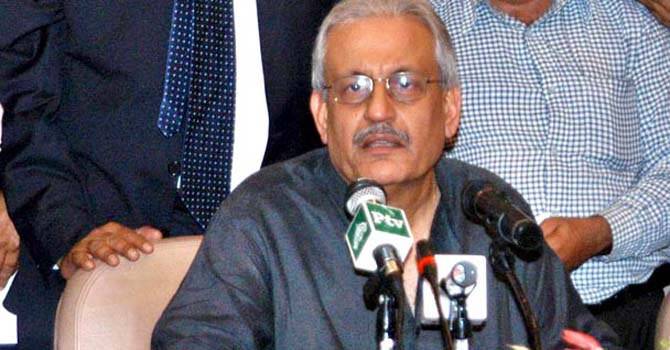We often find our political experts singing praises of the responsibility which political party leaders such as Prime Minister Nawaz Sharif and former president Asif Ali Zardari have shown in coming together over issues. While there is no denying that Pakistani politicians have certainly learned their lessons as far as preventing the suspension of the constitution is concerned, the kind of consensus that we have been seeing of late is hardly doing democracy any favors.
Some would say that veteran politician Raza Rabbani has proved to be a great hero for democracy for speaking his mind about voting against his conscience during the passage of the 21st amendment in the Senate. He is certainly a hero for democracy, but hardly for simply shedding tears when his constituents waited for him to do the right thing, at least in his view. In the end, it was his vote that would have made a difference, albeit at the cost of the seat of Chairman Senate.
But the heroes that I am talking about are the ones who are condemned and cornered by their parties and are pressured every election season to follow the party leadership. No one is opposing a little whipping every now and then, but when the Prime Minister writes to the Election Commission for suspending the membership of an MPA for voting for the Senator of another party, you know that things have gone too far. Similar is the case for constitutional amendments preventing voting against party liners.
People such as Javed Naseem of the PTI, who has been thrown out of the party for issuing dissenting statements against the alleged corruption of the party leadership (treatment of own medicine), and Wajihuzzaman of PML-N, both from the KP Provincial Assembly, are lone warriors for the fight of the rights of the individual legislator. Same goes for many more individual MPs, such as Jamshed Dasti, breaking away from their political parties for whatever reasons they had to give.
The greatest damage that the party leaders are doing to the very fragile democracy in Pakistan is to try blocking individual vote of dissent in party lines in the name of preventing corruption. Just the very mention of the expression “horse trading” triggers a knee jerk reaction from the media and the people alike, limiting the individual delegate’s choice and influence. We must remember that the claims and allegations of corruption are not its proof, and a politician who switches parties is not necessarily corrupt. The need of discouraging “horse trading” stems more out of political parties protecting their investment than looking after the interest of the people or penalizing corruption.
The greatest example of such suppression of individual legislators could be witnessed in the recently concluded Senate elections. Even though all parties try blocking independent voting within their rank and file, two have been at the forefront for proposing amendments to the Senate election procedure. PML-N and PTI were all for changing secret ballot to open show of hands, only to be blocked by the PPP and JUI-F.
While there is no harm at all in switching to open voting, it is also important to understand the motives of the political parties supporting the proposed 22nd amendment. This is probably to discourage what little hope individual MPs have to vote for the candidate of their choice, even if they are not from the same party. What our party leaders are now happy with is the absolute consensus for passing controversial constitutional amendments and electing the Senate Chairman unopposed, as long as their orders are obeyed. Party discipline.
Actually secret ballot hardly even matters as dissenting members of the legislature are pressurized by their parties already. However, open voting works well in legislative systems where members are not threatened with suspension for voting as per their will.
In Pakistan, the entire purpose that it would serve for now would be helping the media figure out which Senators from other parties voted for Shibly Faraz, the PTI candidate for the position of Deputy Chairman Senate, over Maulana Abdul Ghafoor Haideri, the cleric backed by the consensus of secular parties.






